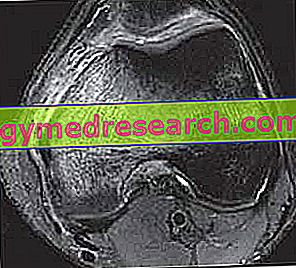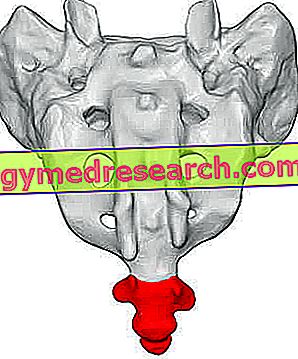Generality
Apathy is a psychological state characterized by a decline or absence of motivation, by an evident lack of interest in life and by a generalized indifference towards the surrounding world.

The causes of apathy are numerous. In fact, it can derive from: a psychological illness, like dysthymia; from a neurological disease, such as Alzheimer's disease or Parkinson's; from the excessive use of psychoactive substances, such as alcohol or cocaine; etc.
The treatment of apathy depends on the triggering causes and generally involves the use of drugs and the use of psychotherapy.
What is apathy?
Apathy is a psychological condition characterized by the absence of emotional reactions to life events and an obvious reduction in any type of interest.
An apathetic subject - that is, a person with apathy - is an individual indifferent to what happens around him, who is not interested in establishing social relations with other people, who is not motivated in the practice of any work or activity and who does not enjoy the life.
ORIGIN OF THE NAME
The word apathy has Greek origins and derives from the word "pathos" (πάθος), which means "emotion", anticipated by the privative alpha (in Italian the "a" in front of "patia"), which means "without".
Therefore the literal meaning of apathy is " without emotions ".
Causes
Apathy is a symptom of some psychiatric diseases, of different neurological diseases and of the abuse of various psychoactive substances.
Furthermore, it sometimes appears in association with: head trauma, nutritional deficiencies, yellow fever, syphilis, hyperthyroidism, porphyria and tuberculous meningitis.
PSYCHIATRIC CAUSES
Among the psychiatric diseases, the possible causes of apathy are:
- Schizophrenia
- Dysthymia
- The forms of minor depression
NEUROLOGICAL CAUSES
The neurological diseases that can cause apathy are:
- Alzheimer's disease
- Frontotemporal dementia
- Huntington's disease
- Parkinson's disease
- Progressive supranuclear palsy
- stroke
- Vascular dementia
- Endocranial tumors
- Hepatic encephalopathy
PSYCHOACTIVE SUBSTANCES CAUSING APATIA
The psychoactive substances that most commonly cause apathy are:
- Cocaine
- Amphetamines
- The alcohol
To learn more: Apathy - Causes and Symptoms
Symptoms and Complications
The typical symptom of apathy is the lack of motivation .
This lack of motivation leads to various consequences, including:
- The inability to carry out or carry out any work activity or not.
- Low energy levels
- Disinterest in all those activities that aroused curiosity and interest before the onset of apathy
- Disinterest in establishing new social relationships and maintaining existing ones.
- Tendency to isolate itself.
- Problems in the workplace.
APATIA AND DEPRESSION ARE THE SAME WHAT?
Although they are similar in terms of symptoms, apathy and depression are two different conditions. If it is true that both cause disinterest in life and lack of motivation, it is equally true that only depression involves feelings such as despair, guilt and suicidal tendencies.
Diagnosis
For a diagnosis of apathy, the following are fundamental: an accurate physical examination, a careful medical history (or clinical history) and an evaluation of the psychiatric profile .
Any use of laboratory analysis (blood tests, etc.) and diagnostic imaging tests (X-rays, CT scans, nuclear magnetic resonance, etc.) serves to definitively clarify the causes.
A precise knowledge of the triggers of apathy allows the doctor to plan the treatment most appropriate to the circumstances.
CRITERIA FOR DIAGNOSIS
According to the experts, the main diagnostic criteria that establish the presence of apathy are:
- The patient shows a significant decrease or complete absence of motivation, regardless of his age, his cultural background and other similar aspects.
- The patient manifests behavioral alterations, emotional fluctuations and changes in thinking skills.
Behavioral alterations hinder interpersonal relationships and the accomplishment of daily activities.
Emotional fluctuations and changes in thinking skills, on the other hand, are responsible for the lack of interest in the news and knowledge of new people.
- The ailments of which the patient suffers significantly affect the quality of life, in every area (work, social, etc.).
Treatment
Generally, apathy treatment involves drug therapy, depending on the triggering causes, and psychotherapy .
In certain circumstances, such as in the case of apathy following the abuse of alcohol, it is also essential to change one's lifestyle (in the case in question, to stop drinking alcohol).
Finally, recently, more and more clinical trials are demonstrating the therapeutic importance of attending support groups for patients or former patients with apathy (or similar disorders).
PHARMACOLOGICAL TREATMENT: SOME EXAMPLES
In this section, the article reports the pharmacological treatments foreseen in some specific situations:
- In case of Alzheimer's disease : drug therapy involves the administration of anti-dementia medicines, such as donepezil, galantamine and rivastigina.
- In the case of dysthymia and minor forms of depression : drug therapy consists of the administration of different classes of antidepressants, including selective serotonin reuptake inhibitors (fluoxetine, fluvoxamine and paroxetine), serotonin and norepinephrine reuptake inhibitors (duloxetine and venlafaxine) and tricyclic antidepressants (clomipramine and imipramine).
- In the case of Parkinson's disease : drug therapy involves the administration of medicines belonging to the category of dopaminergic agonists. A classic example of a dopaminergic agonist used in the treatment of Parkinson's apathy is ropinirole.
- In the case of schizophrenia : drug therapy involves the administration of antipsychotic medicines. Acting on dopamine (a neurotransmitter in the brain), antipsychotics have a calming, anti-clinal and mood-stabilizing effect.
PSYCHOTHERAPY
Psychotherapy is a term with wide meaning, which includes various techniques of psychological treatment. Among these techniques, the most practiced in case of apathy are: cognitive-behavioral therapy and family therapy .
Entering more details:
- Cognitive-behavioral therapy is a form of psychotherapy that aims to teach the patient how to recognize and dominate problematic behaviors (or, in specialized jargon, inactive behaviors).
- Family therapy is a form of psychotherapy that affects the whole family of the patient.
Briefly, it is based on the concept that parents, siblings and other close relatives play a decisive role in supporting their loved one, during the therapeutic path provided for him.
In order for family therapy to be effective and the patient receives the support it needs, it is good that the family learns the characteristics of apathy and the disease that causes the latter.
IMPORTANCE OF COMBINING PHARMACOLOGICAL TREATMENT WITH PSYCHOTHERAPY
The combination of psychotherapy and pharmacological treatment is much more effective than psychotherapy alone or pharmacological treatment alone. For this reason, it is good practice never to separate (even temporarily) the two treatments.
POSSIBLE THERAPIES OF THE FUTURE
In recent years, some scientific investigations have demonstrated the effectiveness of a treatment, known as cranial electrotherapy stimulation .
Patients with apathy who seem to benefit the most from cranial electrotherapy stimulation are those who have suffered traumatic brain injuries, precisely at the frontal lobe of the brain.
Prognosis
Apathy is a condition whose prognosis depends on the severity and curability of the triggering condition.
For example, a form of apathy due to a neurodegenerative disease such as Parkinson's, although well treated, generally has a negative prognosis. Conversely, a form of apathy following alcohol abuse may also have a positive prognosis.



